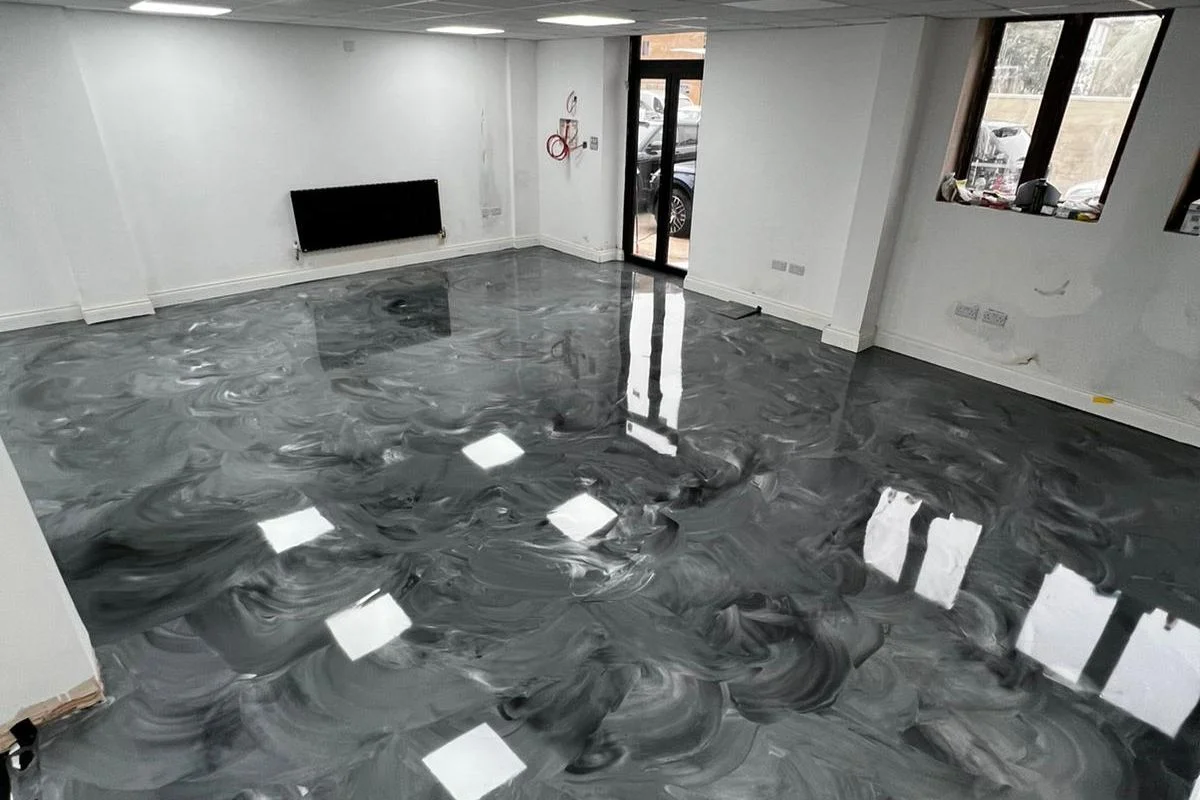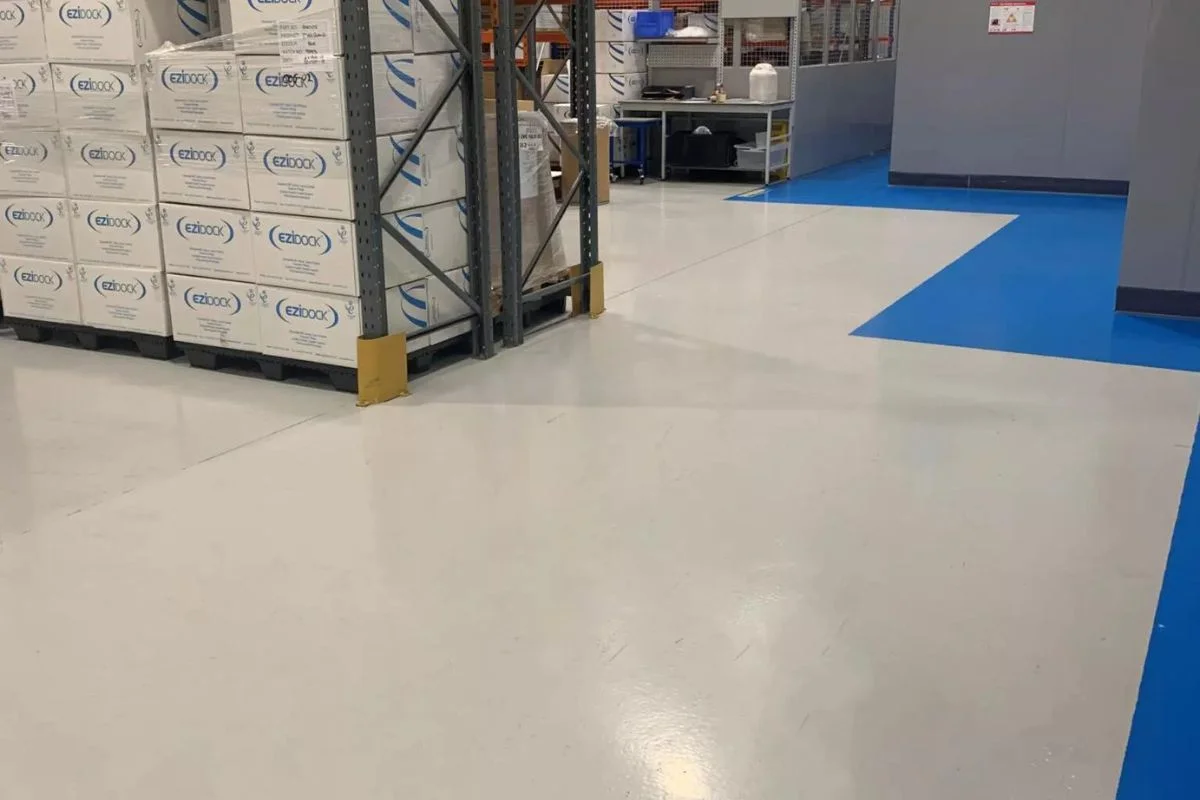Blog

In the realm of interior design, every element contributes to the ambiance and character of a home. From the color palette to the furniture selection, each choice reflects the homeowner’s style and personality. Among the myriad options available, resin flooring stands out as a versatile and innovative choice that has gained popularity in residential spaces.
Resin flooring offers a unique blend of functionality and aesthetic appeal, making it an increasingly sought-after option for homeowners looking to elevate their home design. With its seamless finish, customizable design possibilities, and durability, resin flooring has emerged as a transformative solution that transcends traditional flooring materials.
Brief overview of RESIN FLOORING
Resin flooring, a versatile and innovative surfacing solution, has gained significant traction across various industries and residential spaces. Unlike traditional flooring materials, resin flooring comprises synthetic compounds like epoxy, polyurethane, or acrylic, which are mixed with hardening agents to form a durable and seamless surface. Renowned for its exceptional durability, customizable designs, and easy maintenance, resin flooring has become a preferred choice for environments demanding high performance and aesthetic appeal. From industrial warehouses and healthcare facilities to modern homes and commercial establishments, resin flooring offers a seamless blend of functionality, style, and sustainability, making it a standout option in the realm of contemporary surfacing solutions.
Definition and composition of RESIN FLOORING
Resin flooring is a type of flooring system composed of synthetic resins such as epoxy, polyurethane, or acrylic, combined with various additives and hardening agents. These resins are typically mixed with curing agents or catalysts to initiate the chemical reaction that transforms the liquid resin into a solid, durable surface. The composition of resin flooring may vary depending on the specific requirements of the application, but in general, it involves layering the resin mixture onto a prepared substrate to create a seamless, smooth, and highly resistant floor surface. The precise formulation and application method of resin flooring depend on factors such as the intended use, environmental conditions, and desired aesthetic finish.
Types of RESIN FLOORING
Epoxy Flooring:
- Epoxy flooring is a popular choice known for its high durability and chemical resistance.
- It consists of epoxy resin mixed with a hardening agent, forming a rigid and durable surface.
- Epoxy flooring is widely used in industrial settings, garages, commercial kitchens, and healthcare facilities due to its seamless finish and easy maintenance.
Polyurethane Flooring:
- Polyurethane flooring offers excellent resistance to abrasion, chemicals, and UV exposure.
- It is highly flexible and resilient, making it suitable for areas prone to heavy foot traffic and impacts.
- Polyurethane flooring is commonly used in warehouses, manufacturing plants, sports facilities, and retail spaces.
Acrylic Flooring:
- Acrylic flooring, also known as MMA (Methyl Methacrylate) flooring, is characterized by its rapid curing time and durability.
- It can be installed quickly, making it ideal for fast-track projects and environments requiring minimal downtime.
- Acrylic flooring is often used in commercial kitchens, hospitals, schools, and public areas where hygiene and safety are paramount.
Polyaspartic Flooring:
- Polyaspartic flooring is a type of polyurea coating known for its fast curing time and high chemical resistance.
- It offers superior adhesion to various substrates and can be applied in a wide range of temperatures.
- Polyaspartic flooring is commonly used in automotive facilities, aircraft hangars, and other high-traffic environments requiring quick installation and long-lasting performance.
used in RESIN FLOORING
Materials Used in Resin Flooring
Resin:
- Resin is the primary component of resin flooring, typically composed of epoxy, polyurethane, acrylic, or polyaspartic compounds.
- Epoxy resin is known for its exceptional durability and chemical resistance, making it suitable for a wide range of applications.
- Polyurethane resin offers flexibility and UV resistance, making it ideal for outdoor and high-traffic areas.
- Acrylic resin is valued for its rapid curing time and ease of application, making it suitable for fast-track projects.
- Polyaspartic resin is known for its fast curing time and excellent adhesion properties, making it suitable for demanding environments.
Hardening Agents/Curing Agents:
- Hardening agents or curing agents are added to the resin to initiate the chemical reaction that transforms the liquid resin into a solid, durable surface.
- These agents vary depending on the type of resin used and the desired curing time and properties of the flooring system.
- Aggregates/Fillers:
- Aggregates or fillers may be added to the resin mixture to enhance properties such as slip resistance, impact resistance, or decorative effects.
- Common aggregates include quartz, silica sand, aluminum oxide, or colored flakes, depending on the desired aesthetic and functional requirements.
Pigments and Dyes:
- Pigments and dyes are used to add color to resin flooring systems, allowing for customization and design versatility.
- They can be mixed into the resin mixture or applied as surface coatings to achieve desired colors and effects.
- Sealers and Topcoats:
- Sealers and topcoats are applied over the cured resin flooring to enhance durability, chemical resistance, and aesthetics.
- They provide a protective barrier against stains, abrasion, and UV damage, extending the lifespan of the flooring system.
- By carefully selecting and combining these materials, resin flooring systems can be tailored to meet specific performance requirements, aesthetic preferences, and environmental conditions in various residential, commercial, and industrial settings.
Conclusion
In conclusion, resin flooring stands as a versatile and innovative solution that has revolutionized the surfacing industry. Its widespread adoption across diverse sectors, including industrial, commercial, and residential spaces, underscores its remarkable attributes and benefits.




